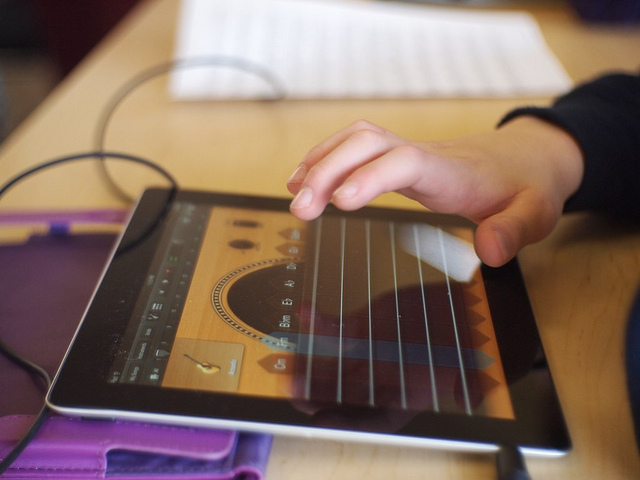A group of French doctors presented a new study in the area of pediatric anesthesiology at this year’s World Congress of Anaesthesiologists in Hong Kong. The University of Lyon-based researchers focused on child and parental anxiety before ambulatory surgery. Their results, which include the finding that iPad-use in children is as effective at lowering pre-surgical anxiety as a standard sedative, will be published later this year.
“Our study showed that child and parental anxiety are equally blunt by MDZ [use of sedative] or TAB [use of iPad],” the authors wrote.
Previous studies have shown that iPads and other tablets may have a positive effect on anxiety in children undergoing medical procedures. The researchers in this study went beyond these previous findings to compare the effects of a sedative with the use of game applications on an iPad tablet, on anxiety in children between the ages of 4 and 10 years before and after undergoing surgery. A secondary aim of the study to was to evaluate the effect of the use of the game applications on parental anxiety before and after the surgery, as well as parental and provider satisfaction.

Over 100 children were randomly divided and received either a pre-operation sedative (Midazolam) (MDZ) or twenty minutes with an iPad tablet (TAB). Child and parental anxiety was measured by psychologists at three intervals: 1) arrival at the hospital; 2) at child/parent separation; and 3) during induction.
Anxiety was also measured post-surgery. Parents were asked to rate their satisfaction with the procedure, and anesthetic nurses were also asked to rate their satisfaction regarding the quality of induction.
The researchers found that anxiety scores in child and parental measures, in both the MDZ and TAB groups, were not different nor did they evolve differently throughout the time points. However, both parents and anesthetic nurses found the quality of the procedure more satisfying in the TAB group.
Similar distractions have been studied before in the same population. However, the Lyon study appears to be the first in finding a similar effect to a pharmacological alternative. Despite having similar effects on anxiety reduction as a sedative, the use of iPads does not have the negative side effects that these can sometimes produce. These results are particularly meaningful given that Midazolam – the benzodiazepines used for anxiety reduction in this study – can cause severe side effects in children including slowed or irregular heartbeat. The findings on the tablet’s effect on anxiety could have further implications for potential non-pharmacological treatments for anxiety in children both in and out of a surgical context.
****
Siqueira, M. D. Q., Tosseti, S., Maréchal, C., Cogniat, B., Berthilier, J., & Chassard, D. (2016). Abstract PR237: Effect of Ipad Tablet on Children and Parental Anxiety During Anesthesia. Anesthesia & Analgesia, 123(3S_Suppl), 302-303. (Abstract)















Amazed that would seems like common sense requires a study.
On a related note, prior to minor surgery last year, I skipped taking Versed as a preop med and listened to guided imagery sessions on my Kindle. Worked great and had a fantastic recovery.
By the way, one of the arguments for using Versed as a preop med is it makes you forget unpleasant things. Uh, all I remember was being wheeled to the operating room and positioned on the table correctly and then waking up in the recovery room feeling relieved everything was done. No unpleasantness whatsoever.
Report comment
One thing that confuses me is the conflation of nervousness before surgery with a childhood ongoing condition of anxiety. It seems unfortunate to me that the same word is used for both conditions. I have had bad anxiety from the time I was a child, and it seems to me that it confuses people when “being nervous or worrying” is used in conjunction with “anxiety”. But for all I know, I am the only person who is bothered by this distinction!! Any comments from the author on how these are medically distinguished would be welcomed.
Report comment
Hi PaisleyToes,
Were you reacting to this?
“”The findings on the tablet’s effect on anxiety could have further implications for potential non-pharmacological treatments for anxiety in children both in and out of a surgical context.””
If I am right, then personally, I don’t think they are conflating regular with pre surgical anxiety. It makes sense that they want to see if using an IPAD to relieve anxiety in a pre surgical setting would relieve it in a day to day setting. Any investigation of non med remedies is a win-win in my opinion.
Report comment
I think being anxious before surgery is an entirely different phenomenon than general anxiety, not related to a particular event or worry. I think it’s like standing at the top of a bridge worrying about bungee jumping vs the feeling after you’ve jumped off. I think many people who haven’t really had anxiety disorder see these as the same. I hope that non-med breakthrough would work for both, but if you have 24/hr anxiety, it wouldn’t be practical. But sounds good as a first step in training the brain.
Report comment